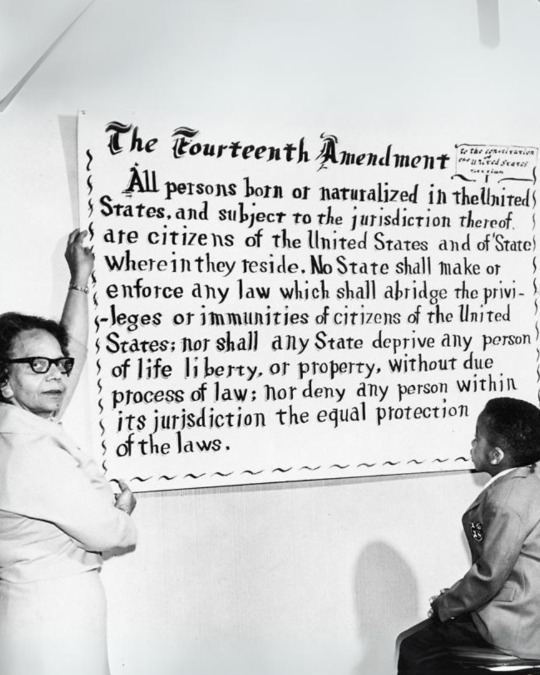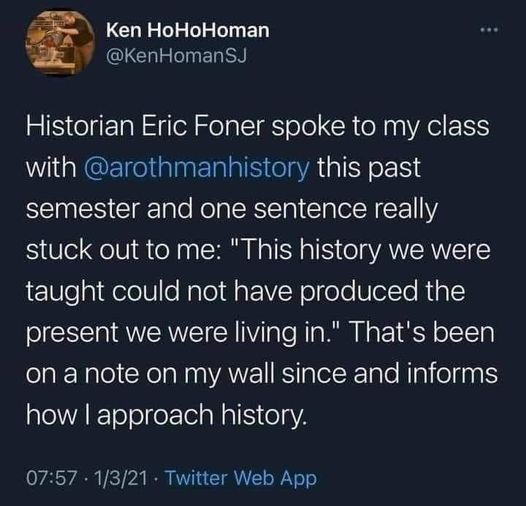#U.S. history
Explore tagged Tumblr posts
Text

( Facebook / Twitter / Instagram / RedBubble / Buy Me A Coffee )
#david cronenberg#cronenberg#2024 election#u.s. politics#u.s. history#the fact that like all of his movies are set in toronto should be a clue but#scanners#dead ringers#crash 1996#videodrome#the fly 1986#crimes of the future#also my graphic novel “Love and Peace” is imminent#which is why i have been less active this year
921 notes
·
View notes
Text

The 14th Amendment was ratified on July 9, 1868, granting citizenship to anyone born or naturalized in the United States — including formerly enslaved Black people. This bill also provided all U.S. citizens with “equal protection under the laws,” marking a critical turning point in the fight for civil rights.
157 years later, the 14th Amendment is under attack. In January, President Trump issued an executive order to end birthright citizenship in the U.S. Activists and public officials fought back in at least 20 states, temporarily blocking the order.
But two weeks ago, the U.S. Supreme Court ruled that lower federal courts do not have the power to block a nationwide order. This decision could put more than 150,000 people born in this country every year at risk of being denied their constitutional rights — including the right to vote.
The president should not get to take away rights the Constitution granted us over 100 years ago.
Join us in the fight to ensure every American can participate in our democracy. Get registered and ready to vote in this year’s local elections now at WhenWeAllVote.org.
#14th amendment#constitution#birthright citizenship#united states#civil rights#voting rights#citizen#citizenship#voting#rights#history#u.s. history#supreme court#scotus#executive order
243 notes
·
View notes
Text



James Baldwin, The Fire Next Time (1963).
152 notes
·
View notes
Text
For those not in the know, the decorated quilts would simply go unnoticed, but for those looking for signs, "the quilts conveyed messages to people who were about to escape, who were planning to escape, and also for people that were on the run," she said. She becomes emotional when thinking about the lengths people went to to help one another reach freedom.
#juneteenth#NPR blog post#U.S. history#fiber arts#quilts#art as resistance#art of resistance#support networks
123 notes
·
View notes
Text

215 notes
·
View notes
Text

#Five Fascinating Facts About Benedict Arnold#Benedict Arnold#facts#trivia#horse#Thomas Edison#powdered wig#Arnold Benedict#U.S. history#history
95 notes
·
View notes
Note
Fun? Tidbit I found while looking up how Cassie's farm could've been in the family since before the civil war: Apparently, some Mexican farm owners kept their land when the US took the southwest. Probably not a lot, but more than 0.
So, possible afro-latina Cassie and Michelle.
That makes sense, especially given all the fuckery that went on with the U.S. annexing Texas so that they had an excuse to annex California. So I'm here for this read.
62 notes
·
View notes
Text
Whitfield Lovell's "Passages" exhibit, which just made its final tour stop in San Antonio, TX.
Deep River
Evokes Civil War-era Camp Contraband (Chattanooga, Tennessee), once the location of a vibrant community of more than 5,000 freedmen and escaped slaves whose labor created much of the city's infrastructure.
During the Civil War many runaway slaves made the dangerous journey across the Tennessee River to a Union Army site referred to as “Camp Contraband.” There they were given asylum and shielded from being captured or returned to their owners.
A spiral of 56 circular wooden foundry molds of various sizes bears the true-to-life portrait (1860s - 1950s) of an African American whose identity has been forgotten. In the center of the room, a large, fragrant mound of earth is strewn with personal effects suggestive of the artifacts carried and left behind by people inhabiting transitional, liminal spaces. Large video images of the Tennessee River cover the walls of the space.
“I see the so-called ‘anonymous’ people in these vintage photographs as being stand-ins for the ancestors I will never know. I see history as being very much alive. One day, 100 years from now, people will be talking about us as history. The way I think about time is very different – I don’t think it really was very long ago that these things happened, it wasn’t that long ago that my grandmother’s grandmother was a slave.”
Visitation: The Richmond Project
Pays tribute to the African American community of Jackson Ward (Richmond, Virginia). An exquisitely rendered mural-sized tableau suggests some of the individuals who inhabited this community. Boxes of Lincoln pennies on the floor reference Jackson Ward's St. Luke Penny Savings Bank, the 1st bank to be founded by an African American, and the 1st bank to be founded by a woman. The bank provided Black-owned businesses with an avenue to success, despite Richmond's oppressively discriminatory practices.
Entering the furnished parlor/dining room transports visitors back in time. Newspapers are stacked on a piano bench, a stack of letters waits to be opened, the table is set for supper, and a radio plays quiet, period music. Drawings of a smartly dressed man and woman on the walls of the room suggest the inhabitants of this intimate space. You feel as if you're in the presence of ghosts.
The Reds (2021–22)
Drawings of Black individuals rendered on vibrant red paper in black shadowboxes. They are presented alongside a red rotary telephone that allows visitors to listen to the Black National Anthem; composed in 1900, the hymn's lyrics speak to adversity, optimism, and triumphant resilience.
“The ancient Native American principles say it takes seven generations to overcome a tragedy, so in this context of generations we can begin to grasp why we are at this point we are living in now.”
#Whitfield Lovell#art#Black art#slavery#history#u.s. history#Black Tumblr#Black women art#Black history#Black History Month#American Civil War#Camp Contraband#art museum#art exhibition#angryredpanda
62 notes
·
View notes
Text

15K notes
·
View notes
Text
New transcription challenge: a 1787 critique of the U.S. Constitution

Just added to Newberry Transcribe: an unpublished 1787 speech -- likely by a Massachusetts Revolutionary War veteran -- arguing against ratifying the U.S. Constitution. The author warns it would concentrate federal power and leave the middle class unable to compete with wealthy elites in national politics.
Help transcribe! Speech opposing ratification of the U.S. Constitution, 1787 or View manuscript at Newberry Digital Collections
#newberry library#libraries#special collections#archives#u.s. history#u.s. constitution#the more things change etc#crowdsourcing
32 notes
·
View notes
Photo

Civil rights leader and activist Medgar Evers fought against Jim Crow laws, protested segregation in education, and launched an investigation into the Emmett Till lynching.
Today would be Leader Evers’ 99th birthday, but he was shot and killed by a white supremacist on June 12, 1963.
We honor his legacy and continue his work of uplifting equal rights for Black Americans. 🙌🏾
#civil rights#medgar evers#jim crow#lynching#equality#black history#u.s. history#segregation#history
235 notes
·
View notes
Text
But for all its virtues, “Days of Rage” provides little historical context, or explanation for the forces that produced and shaped the left’s terrorist turn. Burrough quotes an F.B.I. agent to the effect that in 1972 there were over 1,900 domestic bombings in the United States, the implication being that they were all committed by left-wing groups. But for many decades before, right-wing groups were responsible for much, perhaps most of the nation’s political violence. The militant anti-Communist Minutemen organization was founded in 1960 by Robert DePugh, who published a pamphlet a year later entitled “Principles of Guerrilla Warfare”; indicted in 1968 for conspiracy to commit bank robbery, he went underground before being captured the following year. Anti-civil rights bombings by Klansmen were so common in Birmingham, Ala., in the early 1960s (including the one in 1963 that left four young girls dead in the 16th Street Baptist Church) that the city was derided as “Bombingham.” In the early 1970s the right-wing Jewish Defense League was planting bombs and engaging in other violent anti-Soviet and anti-Arab activities. As the black militant H. Rap Brown famously observed in 1967, violence was “as American as cherry pie.” Left wingers like Weatherman and the Black Liberation Army didn’t invent political violence in the late 1960s and ’70s.
- From a 2015 NYT review of “Days of Rage” by Bryan Burrough
60 notes
·
View notes
Text
I just spent an entire day untangling a knot in a friend's family tree. It turns out that about 100 years ago, some careless researcher accidentally smooshed together two guys with the same name, in spite of the fact that they lived in different states. Even though this person appears on nearly 500 people's family trees on Ancestry.com, and dozens of people have submitted him as their qualifying ancestor for the Sons/Daughters of the American Revolution, no one has ever taken a second look and thought, "Hmm ... it's a bit weird that this feller was still living in Pennsylvania 15 years after he died in Ohio."
Anyway, I think I have it all sorted out now, and I wrote up and posted a document explaining my reasoning, attached to his profile on the tree I made. I hope it is helpful to someone, and that I'm not about to have 100 angry DAR/SAR members show up at my door with torches and pitchforks because I said that their Revolutionary War Soldier Boy ancestor wasn't actually, and they're not as super special as they thought they were.
#genealogy#the dar/sar is bullshit#people just like to feel special i guess#u.s. history#revolutionary war#sloppy genealogy 'research' is one of my pet peeves#people will just copy and paste any old bullshit without a second look or thought
214 notes
·
View notes
Text
Every year on Juneteenth there seems to be some misunderstandings of the significance of the day, ranging from the idea that it took two years for Texas to learn of the Emancipation Proclamation (false) to it being the final end of slavery in the United States (not quite). I started writing up some thoughts on the long and complicated history of emancipation in the United States that turned into this long and complicated timeline. I'm hoping this will be useful for greater understanding of the importance of Juneteenth.
1780 - Pennsylvania became the first state to pass an Abolition Act. This legislation began ending slavery through gradual emancipation. Gradual emancipation became the model followed in the Northern states include Rhode Island, Connecticut, New York, and New Jersey from the 1780s to the 1820s. Gradual emancipation typically freed people born after a certain date and children born to enslaved people, while others were kept enslaved until they reached a certain age or for the remainder of their lives. By the 1840s these states no longer had enslaved people except in New Jersey where there were still 16 people in enslavement until 1865. New Hampshire never legally abolished slavery, but was also effectively a free state by the 1840s.
1783 - Enslaved people in Massachusetts sued for their freedom stating that they should be free under the new Massachusetts state constitution. The Massachusetts Supreme Judicial Court agreed, effectively making Massachusetts the first state to fully abolish slavery.
1791 - Vermont entered the Union as a new state with abolition of slavery encoded in the state constitution. Ohio, Indiana, Maine, Michigan, Iowa, Illinois, Wisconsin, California, Minnesota, Oregon, Kansas, and Nevada also entered the Union as free states.
1808 - The Act Prohibiting Importation of Slaves goes into effect making the transatlantic slave trade illegal. However, since the children of enslaved women were considered property of the enslaver, slavery propagated within the United States and the domestic slave trade thrived. Smugglers also continued to traffic enslaved people from Africa and the Caribbean to the United States, with the latest known instance being the Clotilda arriving in Alabama in 1860.
April 12, 1861 - The American Civil War begins after eleven Southern states begin an insurrection against the Federal government. The key issue is the expansion of slavery to new states and territories which newly elected President Abraham Lincoln opposes. At the start of the war, the official position of Lincoln and the Federal government is that the war is to preserve the Union, not to end slavery.
January 1, 1863 - The Emancipation Proclamation goes into effect freeing enslaved people in states in insurrection against the United States. This was primarily a military measure meant to deny the Southern insurrectionists the labor of enslaved people. The Emancipation Proclamation excluded the border states of Delaware, Maryland, Kentucky, and Missouri as well as parts of Louisiana and Virginia that were already under control of the Union Army. Since the Proclamation only applied to places not controlled by the Federal government, it effectively freed no one. However, enslaved people who escaped to the Union lines or were in territory subsequently captured by Federal troops were then permanently emancipated.
June 20, 1863 - The western counties of Virginia separate to form the new state of West Virginia, with gradual abolition written into the state constitution.
November 1, 1864 - Maryland abolishes slavery.
January 11, 1865 - Missouri abolishes slavery.
February 27, 1865 - Tennessee abolishes slavery.
June 19, 1865 - As the war was going poorly for the Confederacy, enslavers began sending enslaved people to Texas, the most remote of the slave states. Texas would be the final state to surrender to the Union. On June 19, Union Major General Gordon Grange declared all enslaved people free in accordance of the Emancipation Proclamation. This is the origin of Juneteenth.
December 18, 1865 - The Thirteenth Amendment was passed by Congress on January 31, 1865 and after ratification by three-fourths of the states, it became effective on December 18. The Amendment effectively ended chattel slavery throughout the United States including Kentucky, Delaware, and the 16 enslaved people in New Jersey.
BUT…the Thirteenth Amendment also include a penal labor exemption, meaning that people convicted of crimes could be forced to perform labor. From the convict lease programs of the 19th century, the the chain gangs of the 20th century, to mass incarceration in the 21st century, penal labor has been abused while often being targeted against Black people.
In other words, we still haven't seen the full abolition of slavery in the United States.
#slavery#enslaved people#abolition#antislavery#Juneteenth#U.S. History#American Civil War#african american history#Black history
21 notes
·
View notes
Text
Them: "Hey, why are you doing these daily Black history posts for white people?"
Me:

A new daily series, follow the hashtag #BlackHistoryQuad or bookmark this link.
87 notes
·
View notes
